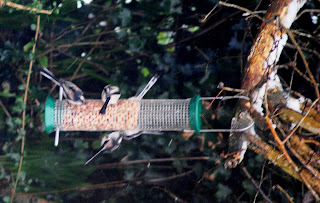This blog may help people explore some of the 'hidden' issues involved in certain media treatments of environmental and scientific issues. Using personal digital images, it's also intended to emphasise seasonal (and other) changes in natural history of the Swansea (South Wales) area. The material should help participants in field-based modules and people generally interested in the natural world. The views are wholly those of the author.
Friday, 18 January 2013
Thursday, 17 January 2013
Smoking the Bees Out?
The European Food Safety Authority has ruled that neonicotinoid pesticides (those most widely used) present an 'unacceptable danger to honeybees' (http://www.guardian.co.uk/environment/2013/jan/16/insecticide-unacceptable-danger-bees?INTCMP=SRCH). This debate has been running for some time and the pesticide manufacturer claims that data supporting this view has been subject to 'over-interpretation'. Our dependence on these currently challenged pollinators means, however, that the data has to be urgently evaluated and appropriate action taken.
Rain- Appreciating Butterflies?
News that, in spite of a generally disastrous year for UK butterflies, species with grass-eating caterpillars have boomed is interesting (http://www.guardian.co.uk/environment/2013/jan/17/grass-feeding-butterflies?INTCMP=SRCH). Meadow brown (Maniola jurtina), Ringlet (Aphantopus hyperantus) and Gatekeeper (Pyronia tithonus) have all shown increases in numbers. It appears that our recent wet summers have encouraged the growth of their preferred nosh!
Saturday, 12 January 2013
Thursday, 3 January 2013
The Fin End of the Wedge
A most disturbing picture is a photograph of thousands of shark fins being dried behind walls in Hong Kong (http://www.google.co.uk/imgres?hl=en&sa=X&tbo=d&biw=1280&bih=751&tbm=isch&tbnid=3uaXr9QCFteKnM:&imgrefurl=http://www.guardian.co.uk/world/picture/2013/jan/03/hong-kong&docid=aKCC-xVLlX9rbM&imgurl=http://static.guim.co.uk/sys-images/Guardian/Pix/pictures/2013/1/3/1357202868787/Thousands-of-shark-fins-d-006.jpg&w=780&h=525&ei=vcLlUMWcC4eM0AWT-IDIBw&zoom=1&iact=hc&vpx=199&vpy=165&dur=11847&hovh=184&hovw=274&tx=162&ty=213&sig=108629131164605584465&page=1&tbnh=137&tbnw=210&start=0&ndsp=25&ved=1t:429,r:1,s:0,i:158). The fins are destined for shark's fin soup but the picture hints at the enormous wastage involved in this process.
Out of Africa?
The new, 6-part 'David Attenborough' series on 'Africa' was unleashed last night (http://www.guardian.co.uk/tv-and-radio/gallery/2013/jan/02/africa-david-attenborough-bbc1-series-pictures) with a first episode on the Kalahari desert. Attenborough takes credit for the (scripted?) voice-over but the footage is provided by natural history photography professionals. It is visually stunning but some of the sequences (e.g. gentle, 'sociable' rhinoceros by star-light; Meerkats being 'conned' by Drongos; territorial male giraffes etc) may be somewhat atypical of the 'normal' species behaviour. The economics of desert lives may predispose species to act in ways slightly different from that seen in other parts of their range. Animal behaviour seems to me to be more flexible than it is usually given credit for! Like some of the critics, I also could have done without the mood music (but I could always have switched the sound off).
Subscribe to:
Posts (Atom)
Seeing the Changes 2183
Early ripening fruit may seem convenient but some folk think it confirms environmental stress. There's also a possibility th...

-
Early ripening fruit may seem convenient but some folk think it confirms environmental stress. There's also a possibility th...
-
It's necessary, where possible, to replace diesel and petrol-fueled vehicles by electrical equivalents. Electric vehicles (EVs) don...


+close+up+on+Mallow+NBGW.JPG)
++basking+in+grass+North+Gower.jpg)
+close+up+Blackpill.jpg)


+pair+meet.JPG)


%20mating%20NWCW.jpg)